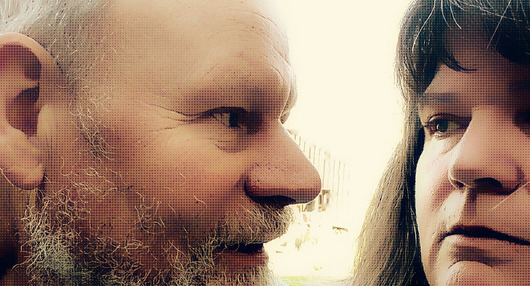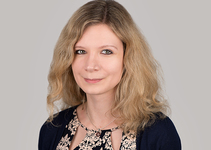|
When Words Have Gone
by Elena Croitoru One morning, my husband talked to me in a language I didn't understand. He sat next to me, on his side of the bed. His lips moved and these well-rounded vowels and consonants echoed in his mouth but it all sounded like a strange song. I tried to speak but I realized that my own words came out with difficulty. I tried to remember how to pronounce my question, "Why are you speaking like that Tim?" My husband stared out of his trembling, tourmaline-blue eyes and only seemed to wince when I said his name. It had been a long time since I didn't trust him. I used to wonder about whether or not he had ever allowed himself to be vulnerable around me, like the time when he said how perfect his father was, even though I had just heard them arguing. But I thought that after forty years, we were going to face death together, with serenity and candor even. I gripped a corner of the duvet and held it tight, ascertaining my surroundings. Was this a vivid dream perhaps? The chiffonier was still there; the oak doors painted in almond white shimmered in the feeble light coming through the windows of our Georgian cottage. The teapot filled with Earl Grey from the night before was still on the nightstand along with my cracked filigree cup. Everything was in its right place. We were still in Wales. But as I told Tim that something peculiar was going on, I realized that I spoke Czech, not English. I blamed my seventy-year-old brain for that. I thought it was a temporary glitch. I tried to speak again, but no English came out of my mouth. Tim’s cheeks turned pink and he placed his hands on my shoulders. He shook me a bit. I pulled back. "What's happening?" I asked. Tim didn't say anything. He got out of bed and dressed in his grey tweed suit, the one he used to wear when visiting the old school, where we both used to teach. He pulled my hand and gestured towards the chiffonier. He took out my cream wool dress and laid it on the bed next to me and then pointed at it. I didn't know what else to do so I dressed up and put my lacquered shoes on. I saw my reflection in them. I looked tired beyond measure. Tim took my arm and we both left the house and strode along the shore where the liquid silver sea modeled the sands into flame-fractal patterns. I tried to remember the formulas that I used to teach my students, like the Lagrange theorem or the Fourier transform. I still remembered functional analysis. I told Tim that but he looked puzzled again. My chest ached as if thorns grew and pulsated inside me. On our right, the local clinic had its doors flung open. We went in. The doctor, a verbose young man, talked over Tim. I could tell that the conversation was tense. They both took turns to stare at me. My hands were shaking and all I could think about was how I was going to spend the remaining few years of my life if I couldn't understand what my husband was saying. I couldn’t go back to the Czech Republic now. Everybody I used to know either died or would not recognize me. Sometimes I used to wonder if I ever lived there at all. I could hardly remember the anger I used to feel at the invasion of Czechoslovakia or how I had to swallow my protests at the normalization that spread over the country. The memories didn't even move me anymore. It was odd, as if my later years spent in Wales were the only reality I knew. I thought about going back, just before I married Tim but it was as if my heart had grown roots in the soil and the rain had pushed them down further and further. The doctor led me to his desk. He typed something in and then pointed towards his computer screen. A message translated in Czech said, "You suffered a mild stroke overnight. I think you can only remember your native language." I read the text twice. I had even forgotten Czech a bit, as I only spoke English for the past twenty years. I covered my face to hide my tears. I couldn't believe the farce that my body had thrown me into. Tim held my shoulders. The doctor typed something else in. "This might be temporary. We'll keep you under observation for a couple of months to see how you do. We'll send a specialist to evaluate you afterwards." The words were blurry. My tears wouldn't stop, but I nodded. Back at home; I spent the rest of the day looking at the dictionary, trying to learn some words. I started with the word family and repeated it a dozen times but I still could not commit it to memory. I would have preferred it if it was Mathematics that I had forgotten rather than English. Tim had gone somewhere outside. He didn't come back until evening. I thought he was trying to deal with my condition but then it crossed my mind that he never tried to learn my native language in the first place. I wondered if he hadn't loved me enough for that. I wrote down Euler's formula just to test my brain. This was something I could still do. I showed it to Tim later. He smiled for the first time that day. He used to smile whenever I looked at him. Tim would attempt to speak to me in the morning but I would stare back wiping my forehead because of the heat that would take over me. He would then go away into his study or into the garden and only come out for lunch or tea. I would spend my days alone in the conservatory with the dictionary and a few blank pages, trying to get back the sweet words that had run away. I worried that when the specialist would came around, Tim would hand me over to him and I would end up spending the next few years in an institution. Tim had good intentions but he didn’t place much faith in himself. He would always leave things to the professionals, like he did with our daughter Debbie when she was depressed about her boyfriend. Because of Tim’s veiled forcefulness, I would forget my own opinions and give in to his charm. I wished I could hear Debbie, worried as she was about her problems, her voice would have been enough even if she didn’t speak Czech that well. But she would never answer her phone. London was all consuming. As I sat in the conservatory one afternoon, looking at the geranium, which had bloomed without me noticing, I remembered the same shade of red on the mountain flower Tim gave me in Peru, while we were hiking twenty years ago. I figured I should find the old photos of us climbing the escarpment and maybe that would make Tim remember who we once were. But I looked everywhere and I couldn't find any of my old pictures. Just like the words, they had gone. Perhaps the flood had destroyed them. I sobbed so much that the neighbor’s cat ran away from our garden. Tim came in. He picked me up and said, "It is going to be all right Marie." It was the first time when he had ever said something in Czech. "I was never good at languages but I will be,” he said, “Trying is just not good enough." His voice had changed into a lullaby, new and familiar at the same time, seemingly belonging to a land that was always between us but we never explored. |
|

